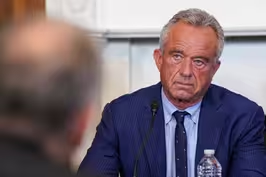
Examining Trump's approach to combat antisemitism on campus
Clip: 7/28/2025 | 6m 19sVideo has Closed Captions
A look at 'Project Esther' and Trump's approach to combat antisemitism on campus
The Trump administration has launched investigations into colleges and universities. The White House accuses the schools of not doing enough to combat antisemitism on campus. Last week, Columbia University settled with the administration in a major deal that could be a blueprint for battles with other schools. Ali Rogin looked into one of the key players behind the administration's approach.
Problems playing video? | Closed Captioning Feedback
Problems playing video? | Closed Captioning Feedback
Major corporate funding for the PBS News Hour is provided by BDO, BNSF, Consumer Cellular, American Cruise Lines, and Raymond James. Funding for the PBS NewsHour Weekend is provided by...

Examining Trump's approach to combat antisemitism on campus
Clip: 7/28/2025 | 6m 19sVideo has Closed Captions
The Trump administration has launched investigations into colleges and universities. The White House accuses the schools of not doing enough to combat antisemitism on campus. Last week, Columbia University settled with the administration in a major deal that could be a blueprint for battles with other schools. Ali Rogin looked into one of the key players behind the administration's approach.
Problems playing video? | Closed Captioning Feedback
How to Watch PBS News Hour
PBS News Hour is available to stream on pbs.org and the free PBS App, available on iPhone, Apple TV, Android TV, Android smartphones, Amazon Fire TV, Amazon Fire Tablet, Roku, Samsung Smart TV, and Vizio.
Providing Support for PBS.org
Learn Moreabout PBS online sponsorshipAMNA NAWAZ: The Trump administration has launched numerous investigations into colleges and universities and withheld billions of dollars in funding, accusing the schools of not doing enough to combat antisemitism on campus.
About 60 schools have been notified of possible investigations.
Last week, Columbia University settled with the administration in a major deal that could be a blueprint for other battles - - or, rather, battles with other schools.
Ali Rogin looked into one of the key players behind the administration's approach.
ALI ROGIN: This is all part of a broader push that the White House says is meant to get elite schools to better address antisemitism.
But how did this effort start?
To help answer that question, we're joined by Arno Rosenfeld, an enterprise reporter for The Forward, where he's also the author of the Antisemitism Decoded newsletter.
Arno, thank you so much for joining us.
First of all, how does this administration define antisemitism and how is it that it's become so central to its targeting of universities?
ARNO ROSENFELD, Enterprise Reporter, The Forward: So the administration's understanding of antisemitism is really rooted in hostility toward Israel, so be that anti-Zionism or these other sort of protests.
It sort of lumps that in with what they consider to be support for terrorism, support for Hamas.
But I would say that they go a little bit further than that in kind of limiting their focus to what you might consider left-wing antisemitism.
ALI ROGIN: But not really saying as much about antisemitism on the right?
ARNO ROSENFELD: Correct.
I mean, sometimes, they give a little bit more or less rhetorical attention to that, but in terms of substance, it's not their focus.
And there are number of people in the administration with ties to right-wing antisemites or who have expressed antisemitism themselves of sort of the right-wing variety.
ALI ROGIN: You have reported on one of the blueprints of the administration's efforts on this.
It's called Project Esther.
What is it and who's behind it?
ARNO ROSENFELD: So Project Esther was created by The Heritage Foundation, which also created Project 2025, another blueprint in advance of Trump taking office with the sort of hope that it would be a blueprint for a second Trump administration, when we didn't know who was going to be president.
But it's a plan that lays out a strategy that the White House and other sort of federal agencies can take to combat, again, this kind of left-wing antisemitism.
They talk about a Hamas support network that is basically a variety of anti-Zionist groups and some groups that aren't even anti-Zionist, but sort of progressive organizations that are critical of Israel, they lump into this antisemitic network.
And then they have a variety of tools that they want the government to use to crack down on that network.
ALI ROGIN: And as you have noted, there were not many Jewish groups involved in the writing of this Project Esther.
Why is that and what does it tell you about this endeavor?
ARNO ROSENFELD: You know, The Heritage Foundation doesn't have a lot of Jewish partnerships.
There are conservative Jewish groups, but they aren't really in the Heritage broader universe.
And so they had some groups on their task force that was working on Project Esther that were Jewish, but when the report came out, the core groups were these evangelical conservative organizations and some conservative think tanks.
And the Jewish groups that were sort of on the list, the bigger list of Jewish groups on the task force, kind of tried to distance themselves from the project.
ALI ROGIN: And how does this project in particular view and talk about critics of Israel's policies and supporters of Palestinian causes?
ARNO ROSENFELD: Well, it's really this idea that they are supporters of Hamas.
So it's not just antisemitism.
It's support for terrorism.
And I think the reason -- or one of the reasons that they use that framework is that opens a whole new avenue of legal options to deal with them.
So if you're a foundation that is providing, for example, material support to a terrorist organization, you can be shut down or sanctioned or face other consequences that you couldn't face even if the government sort of officially declared you were antisemitic.
That's legal, but supporting Hamas is not.
And so that's one way that they set this up.
And the other is that they take even kind of tenuous connections to campus protests or other demonstrations against Israel and equate all of that with antisemitism.
ALI ROGIN: How exactly has the Trump administration implemented Project Esther so far?
ARNO ROSENFELD: So they haven't really commented on whether they're using Project Esther specifically or whether they're just using the same tactics.
And I'm not sure that it matters that much, but we have seen the defunding of universities to pressure them to address civil rights violations against Jewish students or alleged civil rights violations.
That's one area.
We have also seen immigration crackdowns, which have overlapped with campuses, but trying to deport and arrest foreign students, who they say are engaging in antisemitism.
These are all sort of tools that we saw suggested within Project Esther.
There's a lot more vague stuff that it's a little bit hard to pin down, but those are two of the big examples.
ALI ROGIN: So certainly the American Jewish population is not a monolith, but based on your reporting, what do American Jews think of this approach?
Do they feel safer?
ARNO ROSENFELD: So we know in general from public opinion polling that Jews do not support President Trump's approach to antisemitism.
He doesn't have majority support on really any of the tactics that he's implemented in the name of protecting American Jews, although in some areas we do see that more Jews support a couple of his strategies on college campuses, say, than support his job performance overall.
So there is a little segment that is open to it, even if they're skeptical of him as a president.
But I think there's also a sense that, especially on college campuses, Jews are being used as sort of a pawn.
So we saw, right, when Columbia University reached the settlement with the federal government, the education secretary, Linda McMahon, described it as a momentous conservative victory.
And she pointed to things that she said conservatives have been trying to do for many years around DEI and affirmative action and addressing left-wing bias on campus that didn't really have to do with Jews.
And so there's a sense that Jews are being used as the excuse to launch this crackdown on colleges and universities, and that Jews are then going to be blamed as a result of that.
So I think there's a lot of anxiety that, rather than keeping Jews safe, some of these things may be inflaming those sort of tensions.
On the other hand, some folks are really eager to see this address, to see the campus protests addressed more forcefully.
So it's a mixed opinion, but that's some of what I'm hearing from American Jews.
ALI ROGIN: Arno Rosenfeld with The Forward, thank you so much.
ARNO ROSENFELD: Thanks.
AMA president warns against preventive services panel cuts
Video has Closed Captions
Clip: 7/28/2025 | 6m 34s | AMA president warns against preventive services task force cuts (6m 34s)
Distillery blends local flavors to create unique spirits
Video has Closed Captions
Clip: 7/28/2025 | 4m 50s | Rhode Island distillery blends local flavors to create unique spirits (4m 50s)
EU ambassador breaks down implications of U.S. trade deal
Video has Closed Captions
Clip: 7/28/2025 | 9m 7s | EU ambassador breaks down implications of U.S. trade deal: 'We know where we are going' (9m 7s)
How Ben & Jerry’s is recycling food waste into energy
Video has Closed Captions
Clip: 7/28/2025 | 7m 4s | How Ben & Jerry’s is recycling food waste into energy (7m 4s)
Tamara Keith and Jasmine Wright on Trump's trade deals
Video has Closed Captions
Clip: 7/28/2025 | 8m 32s | Tamara Keith and Jasmine Wright on Trump's trade deals and the economy (8m 32s)
Trump says he sees 'real starvation' in Gaza
Video has Closed Captions
Clip: 7/28/2025 | 3m 27s | Trump urges Israel to allow food into Gaza as he sees 'real starvation' there (3m 27s)
Providing Support for PBS.org
Learn Moreabout PBS online sponsorshipSupport for PBS provided by:
Major corporate funding for the PBS News Hour is provided by BDO, BNSF, Consumer Cellular, American Cruise Lines, and Raymond James. Funding for the PBS NewsHour Weekend is provided by...

















